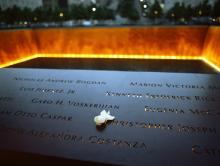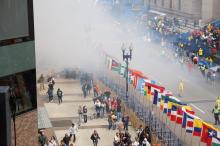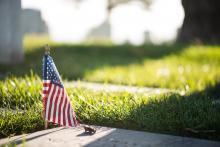vengeance

This is a tale of two orphans, Bruce and Jephthah. A tale of two cities, Gotham and Gilead. A story of curses and vengeance and redemption.

It’s been 14 years since our government declared war on terrorism. How are we doing? It feels like a disastrous game of Whack-A-Terrorist, doesn’t it? We kill one terrorist hiding in one hole, and out pops another one from another hole. Now we are facing the newest threat, a terrorist organization seeking to set up a nation-state, ISIS or IS, as its leadership prefers to be called. The Islamic State, at least, would be a concrete opponent. If they hold on to territory and establish a functioning government, we could at least declare war on a tangible target. Though regrettable it would at least make sense within the logic of war in which states fight other states.
In a recent article for Patheos.com, David French uses Christian Scripture as a justification for “responding to ISIS with wrath and vengeance.” French is a lawyer, a captain in the U.S. Army Reserve and senior counsel at the American Center for Law and Justice. He claims that, according to the Apostle Paul’s letter to the Romans, while individuals are called upon to love their enemies, there is no such call placed on governments. In fact, God has instituted governmental authority in order to execute his wrath against evildoers. And apparently, or so Romans 13 puts it according to French, to know who the evildoers are one simply needs to look at who governments are punishing. French quotes the relevant passage, Romans 13:3-5:
For rulers hold no terror for those who do right, but for those who do wrong. Do you want to be free from fear of the one in authority? Then do what is right and you will be commended. For the one in authority is God’s servant for your good. But if you do wrong, be afraid, for rulers do not bear the sword for no reason. They are God’s servants, agents of wrath to bring punishment on the wrongdoer. [Emphasis added by French.]
French concludes that American Christians should have no difficulty determining the correct response to ISIS. Why? By the fact of determining that justice must be executed against ISIS, our government has determined that their violence is not only an offense against American citizens (he names the beheading victims, journalists James Foley and Steven Sotloff) but against God himself.
French’s analysis strains credulity. Doesn’t he realize that the Romans to whom Paul was writing were themselves victims of government persecution? Does he think that these persecuted Christians felt they were being justly punished? And what about Paul himself, a Roman citizen who was persecuted and executed by the Roman government? Doesn’t French realize that by his own argument, the Roman authorities were executing God’s judgment against Paul? And by his own analysis, French is a captain in a military force that is from its origins a justifiable target for God’s wrath. Why? Because the founding act of the United States was a rebellion against a government, and “whoever resists authority resists what God has appointed, and those who resist will incur judgment.” (Romans 13:2)

Wrath is the only one of the Seven Deadly Sins we attribute to God. And, as pastor Bob, my confirmation teacher in 8th grade would be glad to know I remember, the definition of sin according to the catechism of the Evangelical Covenant Church and similar to most Christian traditions is that sin is “all in thought word or deed that is contrary to the will of God.”
This definitional conundrum raises a few questions. Is it wrong to speak of God’s wrath? Wrong to list wrath among the Deadly Sins? Or are there certain things that are only sins if humans do them but are appropriate to the Divine?
I would argue that yes, wrath can be sinful, but it is not necessarily so. And that during this Lenten season the challenge is not always to suppress wrath but expressing a wrath that is in fact the appropriate response to injustice we see around us every day. In fact, a misguided attempt to avoid wrath can lead to a sin of omission in the failure to practice the “Cardinal Virtue” of justice.
THE SAD RECORD of human history shows that torture has more often been the rule rather than the exception—in criminal justice systems as well as in interethnic, intercommunal, and international conflicts.
The use of torture in such situations—and brutalities that might fall short of torture but are nonetheless brutalities—can have many motivations. Torture demonstrates absolute power. Torture wreaks vengeance. Torture intimidates. Torture punishes. Torture coerces behavior change. Torture harms, and sometimes the sheer (perverted) pleasure of doing harm is enough motivation. And yes, torture is sometimes deployed to elicit information, confession, or “actionable intelligence.” (This was the main ostensible reason why the U.S. tortured after 9/11. But other factors on this list should not be overlooked.)
Torture appears to come all too naturally to fallen humanity. That is a still quite useful theological term that conveys the belief that humanity was created good by a good God but has fallen into sin and thus has suffered disastrous individual and collective damage to its character. Fallen human beings and human communities resort easily to torture.
So one way to talk about the ethics of torture and brutality is to start exactly here—with the historically and theologically grounded claim that torture has more often been the rule rather than the exception in human history, a dark but pervasive aspect of the behavior of fallen humanity. But what if we turn the discussion of torture upside down in what might be a constructive way?
LIBERTY UNIVERSITY in Lynchburg, Va., was founded by televangelist Jerry Falwell. Its publications carry the slogan “Training Champions for Christ since 1971.” Some of those champions are now being trained to pilot armed drones, and others to pilot more traditional aircraft, in U.S. wars. For Christ.
Liberty bills itself as “one of America’s top military-friendly schools.” It trains chaplains for the various branches of the military. And it trains pilots in its School of Aeronautics (SOA)—pilots who go up in planes and drone pilots who sit behind desks wearing pilot suits. The SOA, with more than 600 students, is not seen on campus, as it has recently moved to a building adjacent to Lynchburg Regional Airport.
Liberty’s campus looks new and attractive, large enough for some 12,000 students, swarming with blue campus buses, and heavy on sports facilities for the Liberty Flames. A campus bookstore prominently displays Resilient Warriors, a book by Associate Vice President for Military Outreach Maj. Gen. (Ret.) Robert F. Dees. There’s new construction everywhere you look: a $50 million library, a baseball stadium, new dorms, a tiny year-round artificial ski slope on the top of a hill. In fact, Liberty is sitting on more than $1 billion in net assets.
The major source of Liberty’s money is online education. There are some 60,000 Liberty students you don’t see on campus, because they study via the internet. They also make Liberty the largest university in Virginia, the fourth largest online university anywhere, and the largest Christian university in the world.

What do you say in the face of evil?
The stories from Monday’s attacks at the Boston Marathon are heartbreaking, gut-wrenching. One in particular stands out to me. A woman was waiting for her husband to cross the finish line when the bombs exploded. For three hours she searched frantically for him, not knowing if he was alive or dead, not knowing if he was frantic and looking for her. Her voice cracked and tears flowed with the raw memory as she told of the moment when she and her husband embraced.
Moments like this, even when they end happily, remind us of our vulnerability. As hard as we try to protect ourselves with heightened security measures, we know that complete invulnerability is impossible. I am vulnerable. My wife is vulnerable. My children are vulnerable. We cannot escape it.
In the face of gun violence and bombings, gender violence and rape, we would be irresponsible not to ask big questions about evil and human vulnerability.
A few hours after the bombing, President Barack Obama addressed our natural desire to carry out justice after these events.
[M]ake no mistake; we will get to the bottom of this. We will find out who did this, we will find out why they did this. Any responsible individuals, any responsible groups, will feel the full weight of justice.
Like the president, I want to take action against evil and I want to know I am secure. I hate admitting that I’m vulnerable. But the president’s words didn’t reassure me. They made me feel more vulnerable because the phrase “full weight of justice” is always a veiled call to violence.
For every American student, September starts a new year. September was a time to put away the suntan lotion and refocus on studies -- on more serious pursuits. Gone were the carefree days of summer, and in came the weather that lives perfectly in my memory -- those almost orange leaves, crisp blue skies, and the faint smell of autumn in upstate New York.
I remember it like this 10 years ago. Fourteen and gearing up for a Varsity volleyball season, I had it all. I had only one worry -- that my dad would forget to pick me up from practice, which he never did.
My class had just finished homeroom -- it was my friend's 15th birthday. I don't remember singing, but I'm sure we did. I moved into my world history class, I think we were on the Greeks. And then, it changed. My choir teacher rushed in and frantically told us to turn on the television. We saw the hallways fill with teachers.
I couldn't bear to watch any of the coverage of the Casey Anthony murder trial. I heard snippets of information on occasion: intimations of incest; a car that "smelled of death"; fist fights breaking out as the curious and obsessed (or the profoundly bored?) tried to get a seat in the Florida courtroom.

This Memorial Day, let us see and believe the just peace vision and give the full measure of our living devotion to bring into being a world where war is no more.
